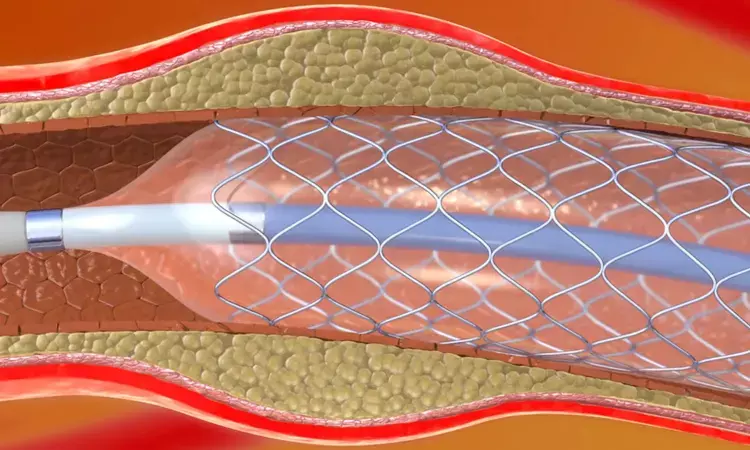- Home
- Medical news & Guidelines
- Anesthesiology
- Cardiology and CTVS
- Critical Care
- Dentistry
- Dermatology
- Diabetes and Endocrinology
- ENT
- Gastroenterology
- Medicine
- Nephrology
- Neurology
- Obstretics-Gynaecology
- Oncology
- Ophthalmology
- Orthopaedics
- Pediatrics-Neonatology
- Psychiatry
- Pulmonology
- Radiology
- Surgery
- Urology
- Laboratory Medicine
- Diet
- Nursing
- Paramedical
- Physiotherapy
- Health news
- Fact Check
- Bone Health Fact Check
- Brain Health Fact Check
- Cancer Related Fact Check
- Child Care Fact Check
- Dental and oral health fact check
- Diabetes and metabolic health fact check
- Diet and Nutrition Fact Check
- Eye and ENT Care Fact Check
- Fitness fact check
- Gut health fact check
- Heart health fact check
- Kidney health fact check
- Medical education fact check
- Men's health fact check
- Respiratory fact check
- Skin and hair care fact check
- Vaccine and Immunization fact check
- Women's health fact check
- AYUSH
- State News
- Andaman and Nicobar Islands
- Andhra Pradesh
- Arunachal Pradesh
- Assam
- Bihar
- Chandigarh
- Chattisgarh
- Dadra and Nagar Haveli
- Daman and Diu
- Delhi
- Goa
- Gujarat
- Haryana
- Himachal Pradesh
- Jammu & Kashmir
- Jharkhand
- Karnataka
- Kerala
- Ladakh
- Lakshadweep
- Madhya Pradesh
- Maharashtra
- Manipur
- Meghalaya
- Mizoram
- Nagaland
- Odisha
- Puducherry
- Punjab
- Rajasthan
- Sikkim
- Tamil Nadu
- Telangana
- Tripura
- Uttar Pradesh
- Uttrakhand
- West Bengal
- Medical Education
- Industry
Bivalirudin helps reduce major bleeding and prevent stent stenosis during PCI in patients with ACS: Study

A systematic meta-analysis from multiple studies revealed that, compared with unfractionated heparin, bivalirudin showed less of a risk of major bleeding during percutaneous coronary interventions in patients with acute coronary syndromes. This finding finds bivalirudin one of the safer agents to be used for anticoagulation during percutaneous coronary intervention (PCI) procedures. The paper was published in the journal Critical Pathways in Cardiology by Krittanawong and colleagues.
Acute coronary syndromes often mandate percutaneous coronary interventions to restore blood flow in the coronary arteries. A choice of anticoagulant used during PCI can make all the difference in outcomes. The two commonly used anticoagulants are unfractionated heparin and bivalirudin, although comparative effectiveness between these agents was debatable. More recently, evidence appears to point to advantages of bivalirudin over heparin on bleeding risks.
In this systematic review, studies comparing outcome data for unfractionated heparin versus bivalirudin during PCI were compared. Comprehensive databases including Ovid MEDLINE, Ovid Embase, Ovid Cochrane Database of Systematic Reviews, Scopus, and Web of Science—have been searched from 1966 to January 2024. Ten prospective trials involving 42,253 participants suffering from ACS have been included in this pooling analysis. Data review and analysis were performed by two independent reviewers. All discrepancies between the reviewers were resolved through consensus. Meta-analyses were done using random effects methods.
Key Findings
• The use of heparin was associated with a higher risk of major bleeding compared to bivalirudin (RR 1.68; 95% CI 1.29-2.20).
• Heparin also led to a higher risk of non-access site complications (RR 4.6; 95% CI 1.75-12.09).
• The risk of TIMI major bleeding was greater with heparin (RR 1.70; 95% CI 1.20-2.41).
• Overall major bleeding risks were increased with heparin (RR 1.87; 95% CI 1.49-2.36).
• Heparin use was associated with a higher risk of cardiovascular disease death (RR 1.26; 95% CI 1.02-1.57).
• Heparin was linked to a higher incidence of thrombocytopenia (RR 1.67; 95% CI 1.07-2.62).
• There were no statistically significant differences between heparin and bivalirudin for all-cause mortality, major adverse cardiovascular events (MACE), stroke, reinfarction, target vessel revascularization, or acute or stent thrombosis.
This meta-analysis has shown, based on the results, that bivalirudin is a much better option than unfractionated heparin for anticoagulation during PCI in patients with ACS. It was found to be associated with a decreased risk of major bleeding. Of note, bivalirudin did not increase the risk of stent thrombosis or MACE. The findings are strongly supportive of bivalirudin as the safer alternative in PCI procedures and will probably allow bettering patient outcome by reducing complications due to anticoagulation.
This meta-analysis demonstrates that bivalirudin significantly decreases the risk of major bleeding compared to unfractionated heparin in PCI for acute coronary syndrome patients. Furthermore, there is no increased risk for stent thrombosis or MACE with bivalirudin, which suggests additional benefits as an anticoagulant during PCI.
Reference:
Krittanawong, C., Ahuja, T., Wang, Z., Qadeer, Y. K., Moras, E., Virk, H. U. H., Alam, M., Jneid, H., & Sharma, S. (2024). Bivalirudin versus heparin in patients undergoing percutaneous coronary intervention in acute coronary syndromes. Critical Pathways in Cardiology. https://doi.org/10.1097/HPC.0000000000000372
Dr Riya Dave has completed dentistry from Gujarat University in 2022. She is a dentist and accomplished medical and scientific writer known for her commitment to bridging the gap between clinical expertise and accessible healthcare information. She has been actively involved in writing blogs related to health and wellness.
Dr Kamal Kant Kohli-MBBS, DTCD- a chest specialist with more than 30 years of practice and a flair for writing clinical articles, Dr Kamal Kant Kohli joined Medical Dialogues as a Chief Editor of Medical News. Besides writing articles, as an editor, he proofreads and verifies all the medical content published on Medical Dialogues including those coming from journals, studies,medical conferences,guidelines etc. Email: drkohli@medicaldialogues.in. Contact no. 011-43720751


